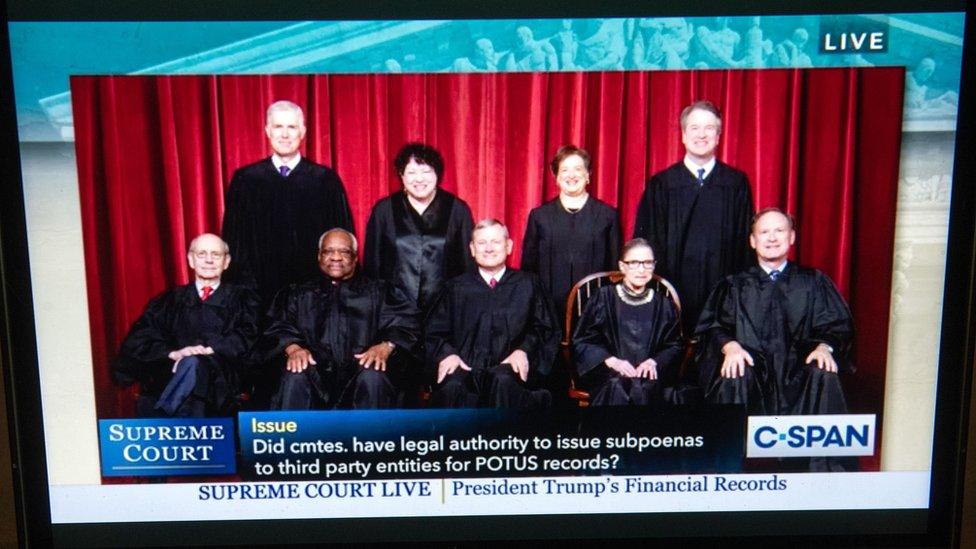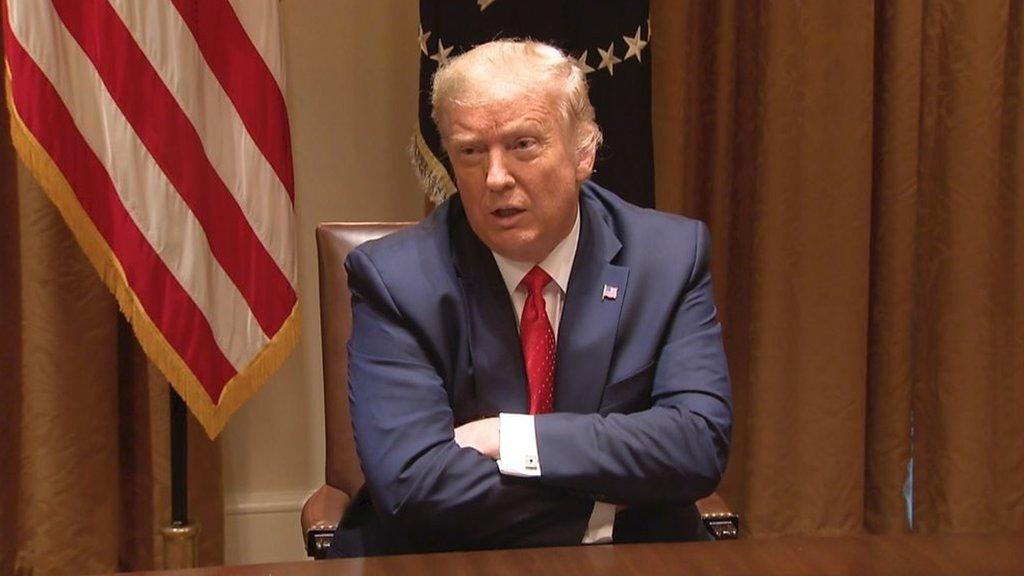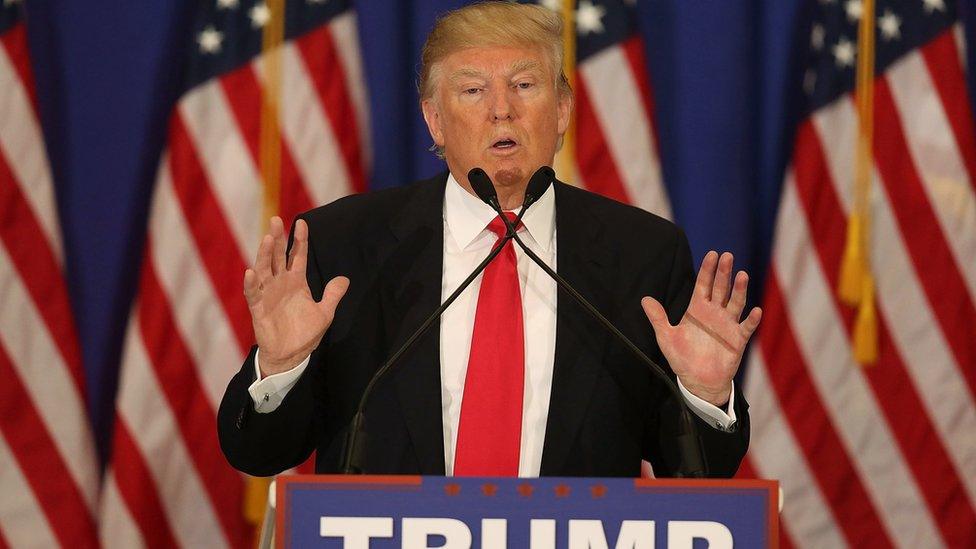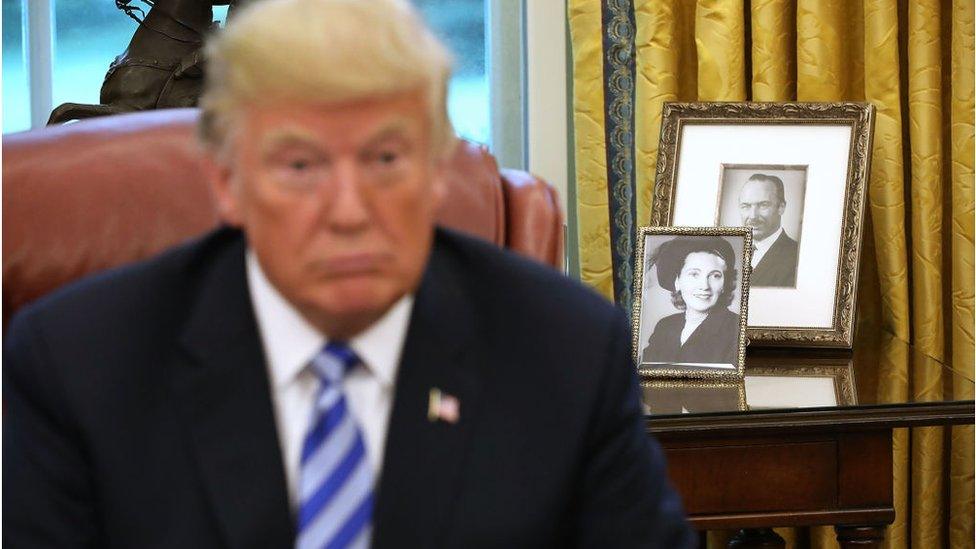Trump taxes: Supreme Court says New York prosecutors can see records
- Published
Trump: Supreme Court ruling a 'witch hunt' and 'hoax'
The US Supreme Court has ruled that President Trump's financial records can be examined by prosecutors in New York.
In a related case, the court ruled that this information did not have to be shared with Congress.
Mr Trump has come under fire for not making his tax returns public like his predecessors.
His lawyers had argued that he enjoyed total immunity while in office and that Congress had no valid justification to seek the records.
Two Democratic-controlled House of Representatives committees and New York District Attorney Cyrus Vance - also a Democrat - had demanded Mr Trump's tax documents over several years in order to determine whether current conflict-of-interest laws on a US president were tough enough.
Mr Trump, a Republican, denies wrongdoing and has called the investigation into his tax affairs a "witch hunt".
"The Supreme Court sends case back to Lower Court, arguments to continue. This is all a political prosecution," he wrote in a series of tweets following the court rulings., external
What do the rulings mean?
In the case regarding the request from the New York prosecutors, the Supreme Court ruled by a majority of seven to two that the president did not have absolute immunity from criminal investigation.
"Two hundred years ago, a great jurist of our Court established that no citizen, not even the President, is categorically above the common duty to produce evidence when called upon in a criminal proceeding," the court said.
"We reaffirm that principle today."
But the two cases regarding Congressional committees were closely watched, as they could have had implications on how far US lawmakers could scrutinise the activities of a sitting president.
The court ruled that Congress had significant, but not limitless, power to request the president's personal information. In this case, the court returned the case to the lower courts.

A political win for Trump

Those wanting to see President Donald Trump's tax returns before the November presidential election shouldn't hold their breath.
In a series of high-stakes rulings on Thursday, the US Supreme Court swatted down the president's defence that, by dint of his high office, he was somehow above the law when it came to state-level criminal subpoenas. That's good news for the president's critics, advocates of limited executive power, and New York prosecutors seeking to investigate Trump's personal finances.
The opinion is not-so-good news for anyone wanting a quick resolution to this case, however. Chief Justice John Roberts sent the lawsuit back down to the lower courts and offered a few new legal avenues for Mr Trump's lawyers to pursue that could continue to put off a day when the president's accounting firm ultimately hands over the documents. And if that day comes, there's still no guarantee that the request, by a secret grand jury, will ever lead to a public disclosure.
In the other case, involving a request by congressional Democrats for Mr Trump's financial records, the court was even more circumspect. It simply punted the case down to the lower court with instructions to further balance presidential privileges with legislative power. The gears of justice will grind even more slowly there.
While legally these decisions may have been, at best, a draw for the president, by pushing the final day of reckoning further down the road, it's a political win.

Why do Trump's tax returns matter?
Two of the cases centred on the ability of the House intelligence, oversight and financial services committees to compel Deutsche Bank and Mazars USA, Mr Trump's long-time accounting firm, to turn over his tax and financial documents. The committees argued that they needed this information to determine whether current conflict-of-interest laws on a US president were sufficiently rigorous.
The case of Trump v Vance was based on on Manhattan District Attorney Cyrus Vance's criminal subpoena - an order to hand over evidence.
Mr Vance argued Mr Trump's documents were needed to determine if financial records had been doctored to cover up hush-money payments to two women in 2016 who say they had affairs with Mr Trump.
Following the ruling Mr Vance said the investigation into Mr Trump's financial affairs would resume.
House of Representatives Speaker Nancy Pelosi, a Democrat, said she would continue to campaign for Mr Trump's financial records to be handed over to Congress.
"Congress will continue to conduct oversight for the people, upholding the separation of powers that is the genius of our constitution," she told reporters.
Will we get to see his tax returns?
It is not clear whether this will happen. Even if Mr Trump's financial records are turned over to prosecutors, they may remain hidden from public view until charges are filed.

The judges are hearing the cases remotely because of the coronavirus
- Published9 July 2020

- Published13 April 2016

- Published14 July 2020
